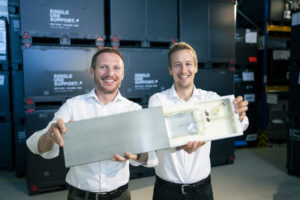Crispr: US startup Profluent uses AI for genetic scissors

The so-called Crispr genetic scissors have long been considered the future of medicine, which should make it possible to combat diseases with the highest precision and speed. With Crispr it is possible to precisely cut DNA strands to replace parts of the genetic material, making genetic manipulation easy and cheap. Among other things, it should be possible to convert cancer cells into healthy muscle cells. Now two revolutions could collide, as Crispr is set to be powered by ChatGPT-like AI, reports the New York Times.
UN passes first global resolution on artificial intelligence
Crispr-AI analyzes enormous amounts of biological data
The technology, which California-based startup Profluent describes in a research paper, is based on the same methods as ChatGPT. Similar to how ChatGPT learns to generate language by analyzing Wikipedia articles, books, and chat logs, Profluent’s technology creates new gene editors after analyzing enormous amounts of biological data. These include microscopic mechanisms that scientists already use to edit human DNA.
These gene editors are based on Crispr and are said to be particularly fast and powerful. Profluent says it has already used one of these AI-generated gene editors to edit human DNA. The startup calls this editor OpenCRISPR-1 “Open Sourcing”. This means it allows individuals, academic labs, and companies to experiment with this technology for free. However, this only applies to the editors themselves, not the AI technology that created them.
Slovak MedTech Powerful Medical secures €7.5M to bring its AI-driven ECG to the next level
Profluent develops synthetic gene editors
Profluent’s project is part of a larger effort to develop AI technologies that can improve medical care. Scientists at the University of Washington, for example, are using the methods behind chatbots like OpenAI’s ChatGPT and image generators like Midjourney to create entirely new proteins and accelerate the development of new vaccines and drugs.
Profluent has not yet tested its synthetic gene editors in clinical trials, so it’s not clear whether they can meet or exceed Crispr’s performance. There is no shortage of naturally occurring gene editors, but these often have to prove themselves in lengthy and expensive tests before they can actually be used in medicine. However, since generative AI continues to improve over time, Profluent’s technology could hold great potential.





























